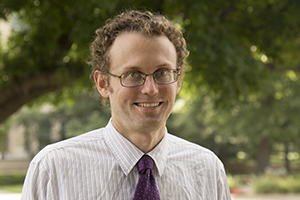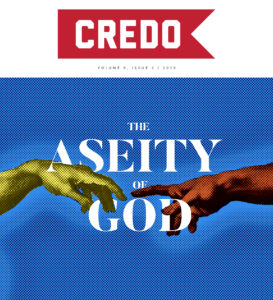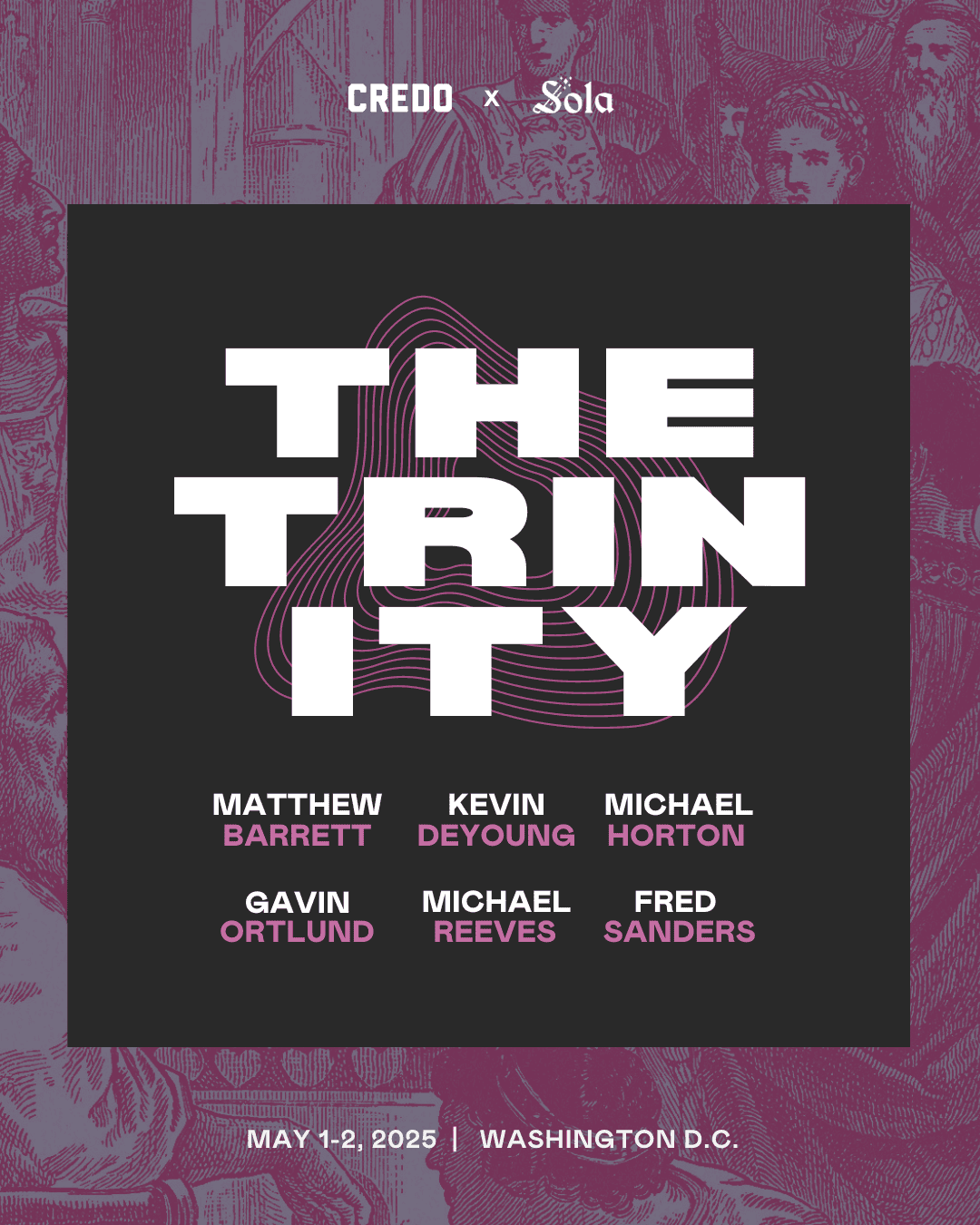Aseity refers to God’s independence in his existence, decrees, will, and acts. In other words, God and only God determines who God is, what God does, and what God wills. Consider the definition provided by Louis Berkhof, who writes that God “has the ground of his existence in himself” such that “he is not only independent in himself, but also causes everything to depend on him.”[1] Aseity means that God is the explanation of all things, including himself.
In creation, we might appeal to secondary causes to help explain certain phenomena (for example, as the author I caused this article even as God is also its cause by providence), but in God the only explanation is God. For this reason, some theologians in past derived God’s immutability and impassibility from God’s aseity. A God who explains his own nature and existence will neither change nor suffer, for these would require a created explanation for God’s condition.
Why Have Modern Theologians Rejected Aseity?
In creation, we might appeal to secondary causes to help explain certain phenomena but in God the only explanation is God. Share on XThough God’s aseity is a divine attribute with a long pedigree, shortly after Berkhof’s time modern theological treatments of the doctrine of God marginalized or criticized aseity for philosophical, apologetic, and hermeneutical reasons. However, rejecting divine aseity undermines the basis in the doctrine of God for the gratuitousness of creation and salvation, just as it jeopardizes our ultimate freedom from evil. Thus, it is important to defend the classical position.
Granting that each theologian will offer unique specific arguments, it is still possible to outline three broad concerns behind the modern tendency to reject aseity. First, many modern theologians are suspicious of the influence of Greek thought in the historical development of the Christian tradition. Perhaps the most notable figure here is Adolph von Harnack, who worries that Greek influence distorted early Christian beliefs that remain influential today. By the scholastic era, Harnack believes biblical themes and doctrines are subordinated “as component parts of a system to a uniform thought.” In the case of Aquinas, for example, Harnack believes an Aristotelian conception of God’s necessity and aseity becomes a “uniform thought” in Aquinas that subordinates and ultimately silences apostolic emphases.[2]
Those who are concerned about the influence of Greek philosophy more often directly target doctrines like immutability and simplicity, with aseity falling casualty as a logical consequence since it is so closely related to these doctrines. If immutability is rejected, then God does change in response to the world. On this account, God lacks aseity because his acts and will would depend on the events of history.
A second concern behind modern skepticism toward aseity is an apologetic effort to provide a response to the problem of evil. The problem of evil can be expressed in a logical form: why would an all-powerful, all-knowing, all-good God allow evil? However, it can also be expressed as an existential crisis: where is God during this suffering? It is this second version of the problem of evil that Jürgen Moltmann addresses in his widely influential book The Crucified God. Here, Moltmann emphasizes the novel “pathos of God,” God’s emotional response to human history as a result of the covenants. When Moltmann asks where God is during the suffering of Auschwitz, the pathos of God allows Moltmann to answer that God suffers with those who are murdered. “There cannot be any other Christian answer to the question of this torment. To speak here of a God who could not suffer would make God a demon,” Moltmann writes.[3] Of course, a God who suffers is one who lacks aseity, for this God’s emotional existence is dependent on the events of history.
A third concern behind modern skepticism of aseity is found in very different theological circles, where biblicist influences have led some evangelical theologians to affirm a partial divine independence and a partial dependence of God on his creation. For example, John Frame acknowledges the aseity of God and provides extensive scriptural support for the doctrine, arguing, “aseity is essential to a credible doctrine of God.”[4] However, Frame then subsequently affirms that there is a “responsiveness” in God that “evaluates” conditions, leading to his emotions.[5] Here, Frame appeals to many other scriptural passages that depict God feeling emotions. In an effort to be scriptural, Frame affirms that God is independent in some respects, while teaching a divine dependence in others – God’s emotions, evaluations, and responses depend on creation. In much classical theology, divine simplicity would entail that a change in God’s emotions is a change in God’s existence and being, for the emotions, existence, and being of God are the same simple reality.
Frame, like many modern theologians, redefines simplicity as a rejection of material composition in God, while allowing a distinction between divine being and emotion.[6] Frame represents a trend in evangelicalism to downplay historic philosophically informed accounts of the doctrine of God by treating seeming tensions in the Bible as equally literal. This allows Frame to affirm descriptions of divine emotions and divine independence as equally literally true. In God’s being and existence, God has aseity, but in God’s emotions, God depends on and responds to created realities.
Some modern theologians reject or neglect aseity under the influence of only one of these trends, but Open Theism provides a helpful illustration of a movement rejecting aseity for a convergence of all three. Consider the anthology The Openness of God with contributions by Clark Pinnock, Richard Rice, John Sanders, William Hasker, and David Basinger. The basic premise of Open Theism is that in creating, God has opened himself to be affected by his creation in numerous ways. In other words, he is voluntarily dependent on creation, giving up his aseity. Throughout the anthology, one sees the argument that the Bible literally depicts creation affecting God, the claim that doctrines denying this are the result of Greek influence, and the claim that a God who allows creation to affect him offers a superior solution to the problem of evil.[7]
One can understand why this perspective had such influence for a time – who would object to rejecting Greek philosophy in favor of biblical teaching, especially with such a clear payoff in terms of the problem of evil? This is why it is so important to demonstrate that the three trends leading modern theology to reject aseity are each mistaken.
Philosophical Corruption of Pure Christianity?
While it is certainly wise to ensure that prior philosophical categories do not constrain or silence revealed scriptural truths (Col. 2:8), it is not at all evident, contra Harnack, that the early church’s use of Greek philosophy centered unbiblical ideas at the expense of revelation. Consider, for example, early Christian use of divine aseity. By the second century, apologists appealed to Greek philosophical categories to demonstrate the truthfulness of the Christian religion to Greco-Roman culture. Their concern was the preservation and contextualization of revealed truth, and early appeals to divine aseity defended a key biblical doctrine.
Justin Martyr, for example, appeals to aseity as the basis for arguing that God is Creator and all of humanity is dependent on him.[8] Likewise, Athenagoras rejects the need to offer sacrifices to God, for “he lacks nothing and has need of nothing.”[9] Athenagoras then argues that Christians must not offer sacrifices, but rather recognize God as the gracious Creator of all that exists. Here, aseity is the philosophical expression of a biblical theme. Unlike many ancient near eastern parallels, Genesis 1 and 2 never depict God creating out of a lack. God needs nothing, but gives us creation as an act of grace, just as after the fall he graciously offers salvation through his Son’s life, death, and resurrection. Where Isaiah ridicules the worship of idols who depend on human craftsmen for their form (i.e., Is. 44:9–20, 46:4–7), and Job emphasizes the fact that God needs nothing and only creates and answers humans out of pure grace (Job 22:2, 35:6–7, 36:23, 38:1–40:2), early apologists speak of God’s aseity. Far from being a philosophical corruption of pure Christianity, aseity is a dogmatic safeguard of the gratuitousness of creation and salvation. God needs nothing, but gives us creation as an act of grace, just as after the fall he graciously offers salvation through his Son’s life, death, and resurrection. Share on X
Aseity and Eschatological Hope
When it comes to the existential problem of evil, the doctrine of aseity also plays an important role. To be fair, modern theologians have done a service to the church in reminding us that philosophical arguments may not provide much help amid the experience of suffering but jettisoning divine aseity is not the right solution. Due to the incarnation, we have a Lord who has experienced suffering in the flesh, and who can empathize with our trials and temptations (Heb. 4:15). In Christ God is in solidarity with us as we suffer.
However, due to divine aseity, there can be no doubt that God will be victorious in the end. Christians will experience a state free from suffering because God shares his life with us by grace, and God’s life is determined by his own perfections, not perturbed by human failings on which it depends. In other words, because God is independent of our sins and not effected by them, the life he offers us is free of their influence, giving us the eschatological hope of an equal freedom.
Emotionally Dependent? The Importance of Sound Exegesis
Finally, clear hermeneutical guidelines can help defend the classical view of aseity against those who would use the Bible to describe God’s emotional condition as dependent on human affairs. Genre matters immensely in biblical interpretation. Many of the key proof texts that describe God’s emotions or will changing in response to human affairs (Gen. 6:6, Ex. 32:9-14, Num. 14:11-25, 1 Sam. 15:11, etc.) are found in narratives. If taken literally, these would imply that God’s will and emotions do depend on creation, such that God lacks aseity in the classical sense.
However, narrative is the genre most likely to appeal to anthropomorphism when discussing God, an accommodation for human finitude to enable the plot to unfold. So, in narrative God lets Moses see his back (Ex. 33:18-20), walks with Adam and Eve (Gen. 3:8), and brings plagues by his finger (Ex. 8:19). In each instance, God is described in human fashion, but most Christians would understand these as examples of God revealing a truth too complex for our understanding in a human way that we may understand. If such passages are figurative, then perhaps narratives of God’s responsiveness are also examples of accommodation.
In contrast, many of the passages that speak of God not having needs (Acts 17:25), not changing (1 Cor. 15:25, James 1:17), and ordering all creation for his purposes (Rom. 11:36) occur in didactic or teaching oriented components of the Bible, where we can expect more precision and clarity. This suggests that modern evangelicals who deviate from classical versions of the doctrine of God may be guilty of neglecting genre in treating various passages in the Bible as equally literal and equally applicable, thereby softening aseity.
Aseity: Essential to an Evangelical Doctrine of God
In the end, doctrines like aseity are a better means for affirming modern impulses to avoid philosophical captivity, to offer apologetic relevance, and to stay attuned to sound exegesis than the alternatives offered by modern theology. Aseity remains one basis in the doctrine of God for Christian appreciation of the gratuitousness and victory of God.
Endnotes
[1] Louis Berkhof, Systematic Theology (Grand Rapids, MI: William B. Eerdmans, 1941), 58.
[2] Adolph von Harnack, History of Dogma, vol. 6 and 7, trans. Neil Buchanan (New York: Dover, 1961), 161, 179.
[3] Jürgen Moltmann, The Crucified God, trans. R. A. Wilson and John Bowden (Minneapolis, MN: Fortress, 1993), 274.
[4] John Frame, Systematic Theology: An Introduction to Christian Belief (Phillipsburg, PA: P & R, 2013), 412.
[5] Ibid., 414.
[6] Ibid., 428–33.
[7] Clark Pinnock, Richard Rice, John Sanders, William Hasker, and David Basinger, The Openness of God: A Biblical Challenge to the Traditional Understanding of God (Downers Grove, IL: Intervarsity, 1994), 22–46, 60–85, 168–171.
[8] Justin Martyr, “First Apology,” in Early Christian Fathers, trans. and ed. Cyril C. Richardson (Philadelphia: Westminster, 1953), §10.
[9] Athenagoras, “A Plea Regarding Christians,” in Early Christian Fathers, trans. and ed. Cyril C. Richardson (Philadelphia: Westminster, 1953), §10.



